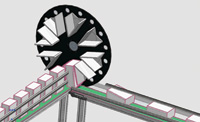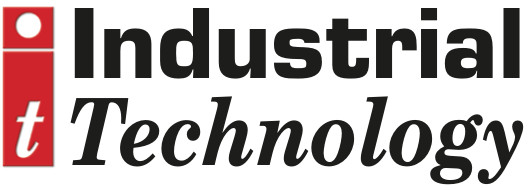
Posted to News on 24th Apr 2020, 00:00
Digital twin proves conveyor concept for coffee producer
In mechanical and plant engineering it is still common practice today that the control of a plant is programmed only after the mechanical parts have been completed. Accordingly, the interaction of mechanics, control, sensors and software is tested for the first time during commissioning. If errors suddenly occur here, it can be expensive.

The solution is the ‘digital twin’ for projects. This is the virtual counterpart of a system to be created, which is stored with all physical, mechanical and electronic properties of the real machine. In this way, comprehensive visualisations and tests can be carried out at an early stage of conception and product development. This not only saves time, but also helps to detect and eliminate errors early on.
A large coffee roasting company has recently benefited from this approach. There, a Minitec conveyor system has been used in the logistics department for some time now, which also had the task of moving the coffee parcels as part of the transport. A special feature was that the packages had to be folded over with the bottom to the front, for which a deflector rail was previously used. However, because the cycle time was to be increased from 40 to 60 units per minute, this method was no longer suitable.Minitec therefore suggested using a so-called ‘reversible star’ for this process. This is a circular construction in which the coffee packets are turned over forwards when the blades are turned. However, prior to implementation, it was necessary to check whether this would also work in practice. Particularly because of the high cycle speed, the aim was to ensure that there would be no problems later – for example that the packets would not get stuck or burst open.
To check the performance of the system, Minitec first implemented the solution as a digital twin. Now the real behaviour could be completely simulated. Based on the knowledge gained, various changes were implemented for the model plant until it worked smoothly. For example, guide rails were installed in order to calm the initial ‘rolling’ of the packages during further transport. The effort paid off: in the finished plant, the process worked without any problems from the very beginning – the customer was enthusiastic. Incidentally, this approach also reduced the overall throughput time for the project.
Minitec project manager Peter Müller comments: “With the digital twin we offer our customers the virtual commissioning of plants before the actual realisation. The concept allows us to visualise ideas at an early stage, to check their usefulness, to eliminate errors and to reduce the testing effort. The time-to-market for projects can be significantly reduced, and the customer saves time and money.”
Unit 1 Telford Road
Houndmills Industrial Estate
RG21 6YU
UNITED KINGDOM
+44 (0)1256 365605









